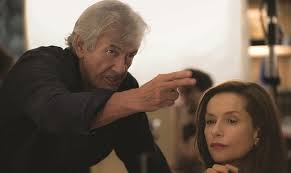ELLE
 Sunday, February 26, 2017 at 09:22PM
Sunday, February 26, 2017 at 09:22PM He Hit Me (and it did not feel like a kiss)
Isabelle Huppert has been cast as the knowing, impervious, Paris-cool damage object in the misogynist fantasies of creepy old pervs so many times audiences barely react to her being abused. As Elle opened on a dark screen over Huppert’s anguished screams I actually thought: “Oh, another Huppert rape scene...” Nothing in it moved or touched me. Director Paul Verhoeven presented the rape as a trope and that’s what I took it for. As the movie developed into a witty, snarky comedy of the discreet charm of the French bourgeoisie – and the casual genius of their scarf-tying – I almost forgot that Huppert's character development was built on her being beaten and then fucked against her will. Isabelle Huppert and a creepy old perv
Isabelle Huppert and a creepy old perv
When the rape came around a second time, it was horrifying. And served its plot function: to further terrify and emotionally paralyze an already PTSD Huppert who cannot connect to any emotion save irritation. So, up to that moment, Verhoeven’s graphic depiction of the traumatic, humiliating sexual assault of a powerful, successful woman could claim at least some moral and aesthetic justification.
Then the rapes came like waves to the shore; cadenced, deliberate markers attempting to show the perversity people must embrace to overcome contemporary alienation and self-alienation. And that's the rubric under which so many normally perceptive reviewers attempt to brand this a feminist film. But Verhoeven ain't no feminist. Throughout his career he’s gotten off depicting violence against women. He digs it. The rape scenes are his most heartfelt and convincing. They're brutal, presented as primal fun for the rapist and kinda thrilling – by the fourth time – for Huppert. Verhoeven frames the fourth rape as a triumphal breakthrough of intimate connection.
This encounter hews to the (male) cliché of a mutually consenting and fulfilling rape fantasy in a meta-y, self-conscious way that's supposed to be “subversive” or about “agency” for women or some such horseshit. Instead, it’s Verhoeven signposting he thinks rape is hot. And that women who go around asking to be beaten up and fucked – because they, like Huppert, have power and wield it – feel improved by rape.
In one particularly ugly but revealing scene, Huppert’s married lover shows up at her office. The night before she told her social circle, including him, about being attacked. He tells her to quit whining and pulls out his dick. He wants a French, in-office handjob, apparently. By way of assent, Huppert picks up a garbage can and puts it between them. This is Verhoeven’s idea of a joke, and for a moment, it’s smirk-inducing. But really, who jacks off a lover into a metal garbage can with no can-liner? What Huppert needed was a box of Kleenex. But that wouldn't support Verhoeven’s 10th-grade sense of humor or present his quote theme close quote.
The men in Huppert’s life view her as a means to an end – sexual, career, nurturing – and couldn’t care less about her emotions or well-being. Contempt and hostility fuel their desire. Vorhoeven then posits rape as a straightforward, unhypocritical expression of male hostility. And that, he suggests, makes Huppert grateful and aroused.
As always in Verhoeven pictures, the cast is a mix of relaxed naturalism and bombastic self-consciousness. Charles Berling, as Huppert’s ex-husband, personifies moral ambiguity. Her lover, Christian Berkel, looks like a horny German cop and performs on that level of subtlety. In a throwaway role, Anne Consigny is relaxed and charming as Huppert’s business partner. She doesn’t get raped, the film suggests, because she seldom asserts herself.
The unrelenting ugliness is wearying. The consensual sex is hyper-meaningless; men and women regard each other with mutual contempt and loathing; deception is the primary relationship glue and everyone’s manners are perfect. The bottomless mean-spiritedness – and Huppert being raped – pushed me away. I checked out for good when Huppert uses binoculars to spy on her hot neighbor and glumly masturbates while he arranges Nativity scene statues. In the immortal words of the wise man from Planet Ten: “So what? Big deal!”
https://www.youtube.com/watch?v=tIQqBlLR4u8
The commentary on French manners and mannerisms proves consistently hilarious and well-observed. The depths of Huppert’s psychological damage are thoroughly plumbed, but in aid of what? Characters turn into plot-puppets, the whole ordeal’s repetitive, at least 20 minutes too long and far less than the sum of its parts. With each gag ‘n sexual assault, Verhoeven’s message becomes increasingly clear: Huppert gets raped because it brings her not only secret pleasure, but personal insight. If that’s your idea of an artistic position, have a ball. But don’t pretend it’s feminist.
Coda
I sent this review to writer/editor Greg Burk (metaljazz.com) and he wrote: “I think of Verhoeven as a comic filmmaker who enjoys twitting our voyeurism and his own, especially since he makes millions at it. We're supposed to feel both aroused and ashamed. Seems like he might have crossed the line, but you may be taking it more seriously than he (having his cake and eating it) intends. The trashcan and the Nativity wank are examples of his comic sense, as you point out. But your charge of sexism is justified, even though he wants to blame men (and himself).”
Greg’s comments made me realize that Elle led me to default to a moral and not a critical response – a not very useful position for a critic. Perhaps I am taking it too seriously. But the film asks the viewer to collude in its own amoral worldview and I don’t wanna. Verhoeven exploits our readiness to chuckle knowingly over genuinely toxic material. He presents his own moral bankruptcy as merely representative of the degraded social commerce of urban sophisticates in the 21st Century. Accepting a picture like this as witty or, much worse, psychologically true, only accelerates that degradation.
 Isabelle Huppert incarnating the director's castration anxiety
Isabelle Huppert incarnating the director's castration anxiety
 French,
French,  Isabelle Huppert,
Isabelle Huppert,  Paris,
Paris,  Paul Verhoeven
Paul Verhoeven 
